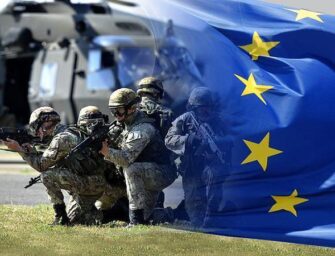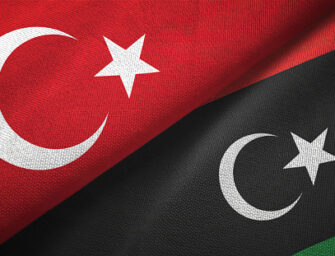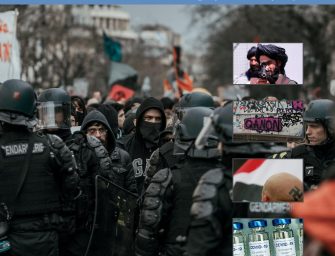Three Palestinians arrested in L’Aquila for terrorism: “Attacks on behalf of the Tulkarem Brigades” (al-Aqsa).
by Claudio Bertolotti
The Italian State Police arrested three Palestinian citizens in L’Aquila – including Anan Yaeesh, a 37-year-old Palestinian currently in jail in Terni after being arrested on January 27th at the request of Israeli authorities who are seeking his extradition – accused of planning terrorist attacks, as part of an operation against extremism. They were taken into custody following the issuance of a pre-trial detention order for the crime of association with terrorist purposes, including international targets, and subversion of the democratic order. According to law enforcement, the arrested were involved in proselytism and dissemination activities in favor of the organization and intended to carry out attacks, including self-sacrifice, against civilian and military targets outside national borders. The Minister of the Interior, Matteo Piantedosi, expressed his satisfaction with the arrest of the three individuals considered extremely dangerous, emphasizing the commitment and investigative excellence of the Italian law enforcement. According to the minister, this operation demonstrates the effective surveillance and preventive action against extremism and radicalization, for which he extended his thanks to the police and the judiciary for the significant success achieved, highlighting the constant attention to threats to internal security.
Who are they and what are the origins and objectives of the Al-Aqsa Martyrs’ Brigades?
“The Al-Aqsa Martyrs’ Brigades are a militant wing of the Fatah movement, founded in the late 1950s by Yasser Arafat and other Palestinian leaders. Emerging at the beginning of the Al-Aqsa Intifada in September 2000, this group has played a significant role in the Israeli-Palestinian conflict, conducting attacks against Israeli military and civilian targets. The Brigades have stated their goal is to fight Israeli occupation and have claimed responsibility for numerous suicide attacks, shootings, and missile launches.
Within this organization, the ‘Rapid Response Group – Tulkarem Brigades’ represents a specific operational articulation that operates mainly in the Tulkarem area, a city located in the western part of the West Bank. This specific group was established with the aim of providing a rapid response to Israeli military incursions, exploiting local terrain knowledge and the ability to quickly mobilize its members in case of conflict.
The nature of the ‘Rapid Response Group’ is characterized by its operational agility and ability to conduct targeted attacks. The group uses urban guerrilla tactics and quickly adapts to battlefield dynamics, making it an effective component within the broader strategy of the Al-Aqsa Martyrs’ Brigades. Their activity aims to create a continuous sense of insecurity among Israeli forces, trying to prevent or slow down military operations in their area of influence.
Despite their determination, the actions of groups like the ‘Rapid Response Group – Tulkarem Brigades’ raise significant questions regarding the cycle of violence in the Israeli-Palestinian conflict. Their operations, often directed against civilian targets, have led to international condemnations and have heightened human suffering on both sides of the conflict. The complexity of their existence and operations reflects the intricate network of causes, identities, and loyalties that characterize the long and painful clash between Israelis and Palestinians.
The presence and actions of groups like the Al-Aqsa Martyrs’ Brigades and their ‘Rapid Response Group – Tulkarem Brigades’ testify to the deep penetration capacity of jihadist terrorism associated with Hamas, which, through a series of appeals to the ‘anger’ of Muslims, has called its followers to strike in defense of Islam. Effectively pushing towards the now established phenomenon of emulative, improvised, and predominantly individual terrorism that has imposed its presence and will to act in Europe since the advent of the Islamic State phenomenon (formerly ISIS) in the years 2014/2017. Today, this autonomous and often unsuccessful terrorism has entered a new competitive dynamic between the Islamic State brand and the ‘new’ actor of jihad, Hamas, which, while positioning itself as a ‘national liberation movement,’ has not failed to extend its vision and call to strike everywhere, with acts of ‘jihad’ aimed at defending Islam from the corruption and violence of the West.”






























 launches on 23rd May. Don't miss it!
launches on 23rd May. Don't miss it! 
 Numbers, trends, analyses, books, interviews
Numbers, trends, analyses, books, interviews

 "(...) non si tratterebbe di droni in grado di fare danni significativi, ma piuttosto di una tipologia di equipaggiamento in grado di fare danni limitati con l'obiettivo di portare l'attenzione mediatica sulla questione"
"(...) non si tratterebbe di droni in grado di fare danni significativi, ma piuttosto di una tipologia di equipaggiamento in grado di fare danni limitati con l'obiettivo di portare l'attenzione mediatica sulla questione"